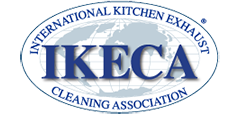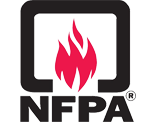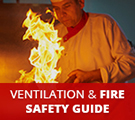New Restaurant Owner’s Guide to Kitchen Exhaust System Cleaning
Get answers to commonly asked questions about commercial kitchen exhaust system cleaning.
 Are you considering opening a new restaurant? While brainstorming ideas for the menu and décor is a lot more fun than considering more mundane things like code compliance, nonetheless you cannot afford to overlook the practical side of things.
Are you considering opening a new restaurant? While brainstorming ideas for the menu and décor is a lot more fun than considering more mundane things like code compliance, nonetheless you cannot afford to overlook the practical side of things.
One activity that is absolutely vital for the new restaurant owner to understand and implement is commercial kitchen exhaust system cleaning for fire code compliance. The following FAQ will help you understand the requirements and benefits of this activity.
What Does Commercial Kitchen Exhaust System Cleaning Include?
There are two types of commercial kitchen exhaust system cleaning: exhaust hood scraping and steam cleaning. Exhaust hood scraping tackles only the areas accessible by hand but is useful because these same areas have the fastest rate of grease buildup. A steam cleaning includes a complete system cleaning, including not just the exhaust hoods but also all of the interior duct work and the rooftop exhaust fan.
What Are the Benefits of Cleaning?
The main benefit of commercial kitchen exhaust system cleaning is to reduce the risk of a grease fire in the exhaust system. This can bring many additional side benefits such as improved kitchen air flow, improved exhaust fan performance and service life, and even the potential for better insurance rates. Cleaning is also necessary to keep code inspectors happy and your restaurant open.
How Often Do I Need Service?
The rate at which you will require cleaning depends on the type and amount of foods prepared and how they are cooked. Most restaurants require monthly exhaust hood scraping and semi-annual steam cleaning.
What Does a Clean Duct Look Like?
The industry standard is to clean to bare metal. Grease may be allowed to accumulate to a depth of no more than 0.125 inches between cleanings.
How Do I Find a Contractor?
The best way to find a qualified kitchen exhaust system cleaning company is to visit the IKECA website and search for member companies in your area. IKECA membership signals that a company has expert cleaners that are fully trained to the highest industry standard. You can rely on IKECA member companies like Flue Steam to provide superior cleaning service every time.
What Documentation Do I Need for Code Compliance?
After a cleaning, you should be furnished with a certification sticker showing the date the system was cleaned as well as inspection reports as needed.
Does This Activity Automatically Protect Against Liability for a Fire?
Yes, but only if the cleaning has been done correctly and completely by a certified contractor. Sloppy or incomplete cleaning from a sub-standard contractor will not protect the owner against liability, because it is ultimately the owner’s responsibility to ensure the work gets done right, according to the National Fire Protection Association Standard.





